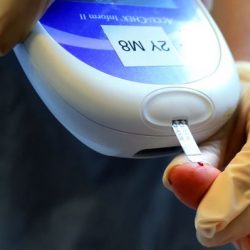An excess of bacteria in the gut can change the way the liver processes fat and could lead to the development of metabolic syndrome, according to health researchers. Metabolic syndrome is a group of conditions including obesity, type 2 diabetes, high blood pressure, high blood sugar and excess body fat around the waist. People experiencing three or more of these conditions … [Read more...]
Diabetes News

Researchers discover new way to measure if a person is pre-diabetic: University of Hawaii Study
A panel of markers have been discovered that helps identify if a person is pre-diabetic by measuring the fatty acids in their blood. This discovery by University of Hawai'i Cancer Center researchers may allow physicians to warn patients years before the onset of diabetes, therefore allowing them to change their lifestyle patterns potentially avoiding the diagnosis of a chronic … [Read more...]
Detecting diabetes in a saliva sample with a smart phone: A Mexican Study
With the participation of Mexican and international experts, the device will present immediate results and will be used for diagnosis within low-income populations. A device that detects in saliva a biological indicator of a possible risk of type II diabetes is the development of a technological and scientific team of the Tec de Monterrey (Mexican University) in … [Read more...]
Diabetes identified as a risk factor for surgical site infections: A Study
Diabetic patients are at considerably increased risk for developing surgical site infections (SSIs) while undergoing most types of surgeries, compared to non-diabetic patients, according to a new study published online in Infection Control & Hospital Epidemiology, the journal of the Society for Healthcare Epidemiology of America (SHEA). "Diabetes has been recognized as a … [Read more...]
New medicine allow weight and diabetes control with a single weekly dose: A Spanish Study
The new generation of incretin-based medicines will allow a coordinated action against the combination diabetes/obesity, also known as diabesity, in some cases with only a single weekly dose, and with the likelihood of additional beneficial effects on other health complications related to this condition, such as cardiovascular and neurodegenerative diseases. The experts in … [Read more...]
Insulin and hormone to brain’s ‘pleasure’ center linked: New York University Study
Insulin, the hormone essential to all mammals for controlling blood sugar levels and a feeling of being full after eating, plays a much stronger role than previously known in regulating release of dopamine, a neurotransmitter that helps control the brain's reward and pleasure centers, new studies by researchers at NYU Langone Medical Center show. "We found that when there's … [Read more...]
Living in densely populated neighborhoods can actually decrease risk of diabetes and obesity: A Study
Torontonians living in neighborhoods that aren't conducive to walking have a 33 per cent greater risk of developing diabetes or being obese, according to new research. The design of Toronto's neighborhoods such as Bridle Path-Sunnybrook-York Mills, Edenbridge- Humber Valley, and Morningside encourage dependency on cars and discourage walking -- risk factors that can lead to … [Read more...]
Discovery of an early predictor of increased diabetes risk: A Canadian Study
A Montréal research team led by Jennifer Estall at the IRCM discovered that a protein found in muscle tissue may contribute to the development of type 2 diabetes later in life. The study's results, published in today's printed edition of the scientific journal American Journal of Physiology -- Endocrinology and Metabolism, indicate that the protein could be a promising early … [Read more...]
Patients with mild hyperglycemia, genetic mutation have low prevalence of vascular complications: A Study
Despite having mild hyperglycemia for approximately 50 years, patients with a mutation in the gene encoding the enzyme glucokinase had a low prevalence of clinically significant vascular complications, findings that provide insights into the risks associated with isolated mild hyperglycemia, according to a study in the January 15 issue of JAMA. "In both type 1 and type 2 … [Read more...]
Universal diabetes testing at first prenatal visit recommended: A Study
The Endocrine Society is encouraged by the U.S. Preventative Services Task Force's (USPSTF) efforts to promote gestational diabetes screening and recommends going a step further to identify undiagnosed type 2 diabetes cases before harmful pregnancy complications can develop. The USPSTF recommendations released Monday called for pregnant women to be tested for gestational … [Read more...]
Potential for new tests in long-term diabetes complications: A Study
Monitoring glucose levels is imperative for diabetes patients, but for some the standard Hemoglobin A1c (HbA1c) test is not valid. Researchers from Johns Hopkins University, the University of Wisconsin, and the University of Minnesota have determined that the fructosamine tests and a novel assay for glycated albumin may be useful for predicting complications related to … [Read more...]
Insulin-producing cells may fail in diabetes, might someday be restored: University of California Study
Two new studies led by UC San Francisco (UCSF) scientists shed new light on the nature of beta cells, the insulin-producing cells in the pancreas that are compromised in diabetes. The first suggests that some cases of diabetes may be caused when beta cells are deprived of oxygen, prompting them to revert to a less mature state that renders them incapable of producing … [Read more...]
Both red and white wine can improve sugar control: An Israeli Study
A glass of red wine every night may help people with type 2 diabetes manage their cholesterol and cardiac health, according to new findings from a two-year randomized controlled trial (RCT) led by researchers at Ben-Gurion University of the Negev (BGU). Additionally, both red and white wine can improve sugar control, depending on alcohol metabolism genetic profiling. In this … [Read more...]
Early insulin treatment for diabetes may produce better outcomes: American Osteopathic Association Study
A pilot study of 23 adults with newly diagnosed type 2 diabetes found early insulin therapy to be as effective as 15 months of oral therapy and may improve the body's ability to produce insulin. The current standard of care calls for initial treatment with oral therapies that suppress glucose production by the liver. In contrast, insulin is a hormone produced by the pancreas … [Read more...]
Traditional Chinese medicines stall progression of diabetes: Endocrine Society Study
Traditional Chinese herbal medicines hold promise for slowing the progression from prediabetes to an official diabetes diagnosis, according to new research accepted for publication in the Endocrine Society’s Journal of Clinical Endocrinology & Metabolism (JCEM). Prediabetes is diagnosed an individual has developed elevated blood sugar levels, but glucose levels have not … [Read more...]
Researchers find metabolic clues to diabetic kidney failure: A Study
About 33 percent of people with type 2 diabetes suffer kidney damage that progresses to end stage renal disease (ESRD), at which point they require either dialysis or kidney transplantation. Scientists have thought that this kidney disease is driven by damage to the glomeruli, blood vessels in the kidney, which spill the protein albumin into the urine. Current … [Read more...]
Research advancements made in diabetes-induced blindness: A Study
Investigators at the Cedars-Sinai Regenerative Medicine Institute have identified new molecular abnormalities in the diabetic cornea that could contribute to eye problems in affected patients. With this new knowledge, investigators aim to accelerate the process of healing and repair in damaged corneas to ultimately reverse the effects of diabetes-induced eye … [Read more...]
Fish derived serum omega-3 fatty acids help reduce risk of type 2 diabetes: A Finnish Study
High concentrations of serum long-chain omega-3 fatty acids may help reduce the risk of type 2 diabetes, according to a University of Eastern Finland study published recently in Diabetes Care. The sources of these fatty acids are fish and fish oils. Type 2 diabetes is becoming increasingly widespread throughout the world, including Finland. Overweight is the most … [Read more...]
Popular blood-diet debunked: A Canadian Study
Researchers from the University of Toronto (U of T) have found that the theory behind the popular blood type diet--which claims an individual's nutritional needs vary by blood type--is not valid. The findings are published this week in PLoS One. "Based on the data of 1,455 study participants, we found no evidence to support the 'blood-type' diet theory," said the senior … [Read more...]
Muscle-strengthening, conditioning in women linked with reduced risk of diabetes: A Danish Study
Aerobic exercise is known to prevent type 2 diabetes, and muscle-strengthening alone or in combination with aerobic exercise improves diabetic control among those with diabetes. Although men who weight train have been found to have an associated reduced risk of developing diabetes, whether such an association exists for women has not been established. In this week's PLOS … [Read more...]
Non-coding DNA implicated in type 2 diabetes: A Imperial College London Study
Variations in non-coding sections of the genome might be important contributors to type 2 diabetes risk, according to a new study. DNA sequences that don't encode proteins were once dismissed as "junk DNA," but scientists are increasingly discovering that some regions are important for controlling which genes are switched on. The new study, published in Nature Genetics, is … [Read more...]
Type 2 diabetes is causes more than three million deaths each year and this number is increasing: A Study
Contrary to a common belief, researchers have shown that genetic regions associated with increased risk of type 2 diabetes were unlikely to have been beneficial to people at stages through human evolution. Type 2 diabetes is responsible for more than three million deaths each year and this number is increasing steadily. The harmful genetic variants associated with this … [Read more...]
Cancer drug protects against diabetes: University of Copenhagen Study
New research shows that low doses of a cancer drug protect against the development of type 1 diabetes in mice. At the same time, the medicine protects the insulin-producing cells from being destroyed. The study is headed by researchers from the Faculty of Health and Medical Sciences at the University of Copenhagen, and has just been published in the distinguished scientific … [Read more...]
Too much hygiene cause diabetes: A Study
The incidence of auto-immune diseases like type 1 diabetes and allergies has risen dramatically in developed countries over the past fifty years. The reasons for this trend are not fully understood but a theory known as the 'hygiene hypothesis' links it to a rise in hygiene standards. According to this theory, eliminating bacteria in food and the environment of infants may be … [Read more...]
Sugar-sweetened beverage tax could reduce obesity and type 2 diabetes in India: A Study
A sugar-sweetened beverage (SSB) tax could help mitigate the rise in obesity and type 2 diabetes rates in India among both urban and rural populations, according to a study published this week in PLOS Medicine. Sanjay Basu and colleagues, from Stanford University, USA, estimated that a 20% SSB tax across India could avert 11.2 million cases of overweight/obesity and 400,000 … [Read more...]
Scientists discover new causes of diabetes: University of Exeter Study
Research by the University of Exeter Medical School has revealed two new genetic causes of neonatal diabetes. The research, published today in the journal Cell Metabolism, provides further insights on how the insulin-producing beta cells are formed in the pancreas. The team discovered that mutations in two specific genes which are important for development of the pancreas can … [Read more...]
More evidence suggests type 2 diabetes is inflammatory disease: A Study
As people's waistlines increase, so does the incidence of type 2 diabetes. Now scientists have a better understanding of exactly what happens in the body that leads up to type 2 diabetes, and what likely causes some of the complications related to the disease. Specifically, scientists from Denmark have found that in mice, macrophages, a specific type of immune cell, … [Read more...]
Genetic difference could put some at greater risk of diabetes: A Spanish Study
Researchers from Brigham and Women's Hospital (BWH) and the University of Murcia, Spain, have shed new light on why people who carry a common genetic mutation may be more at risk for developing type 2 diabetes. By carefully studying healthy subjects, researchers were able to chart the effect of melatonin supplements on blood sugar control. Their results, reported in Metabolism, … [Read more...]
Endoplasmic reticulum stress plays significant role in type 2 diabetes: A Study
A new research report published in the October 2015 issue of the Journal of Leukocyte Biology, suggests that the endoplasmic reticulum plays a more important role in type 2 diabetes and its complications than previously believed. Specifically, when this cell compartment undergoes disruptions (stress) patients experienced poor glycemic control, dyslipidemia, insulin resistance … [Read more...]
Type 1 diabetes prevention: Insulin vaccine undergoes second trial: A German Study
A vaccination against type 1 diabetes will soon be available to young children: the Pre-POINTearly vaccination study will involve children between the ages of six months and two years from across Germany who have a first-degree relative with type 1 diabetes. In the preceding Pre-POINT study a positive immune response was triggered in children aged between two and … [Read more...]
- « Previous Page
- 1
- …
- 5
- 6
- 7
- 8
- 9
- …
- 24
- Next Page »




























